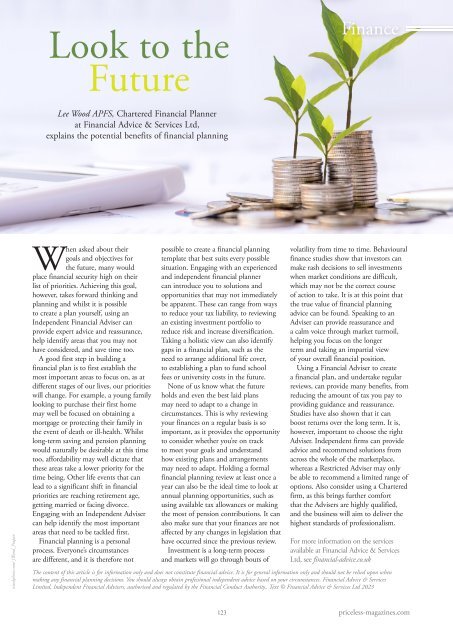Wealden Times | WT258 | November 2023 | Christmas Gift Supplement inside
The lifestyle magazine for Kent & Sussex - Inspirational Interiors, Fabulous Fashion, Delicious Dishes
The lifestyle magazine for Kent & Sussex - Inspirational Interiors, Fabulous Fashion, Delicious Dishes
Create successful ePaper yourself
Turn your PDF publications into a flip-book with our unique Google optimized e-Paper software.
Look to the<br />
Finance<br />
Future<br />
Lee Wood APFS, Chartered Financial Planner<br />
at Financial Advice & Services Ltd,<br />
explains the potential benefits of financial planning<br />
istockphoto.com/ JWand_Prapan<br />
When asked about their<br />
goals and objectives for<br />
the future, many would<br />
place financial security high on their<br />
list of priorities. Achieving this goal,<br />
however, takes forward thinking and<br />
planning and whilst it is possible<br />
to create a plan yourself, using an<br />
Independent Financial Adviser can<br />
provide expert advice and reassurance,<br />
help identify areas that you may not<br />
have considered, and save time too.<br />
A good first step in building a<br />
financial plan is to first establish the<br />
most important areas to focus on, as at<br />
different stages of our lives, our priorities<br />
will change. For example, a young family<br />
looking to purchase their first home<br />
may well be focused on obtaining a<br />
mortgage or protecting their family in<br />
the event of death or ill-health. Whilst<br />
long-term saving and pension planning<br />
would naturally be desirable at this time<br />
too, affordability may well dictate that<br />
these areas take a lower priority for the<br />
time being. Other life events that can<br />
lead to a significant shift in financial<br />
priorities are reaching retirement age,<br />
getting married or facing divorce.<br />
Engaging with an Independent Adviser<br />
can help identify the most important<br />
areas that need to be tackled first.<br />
Financial planning is a personal<br />
process. Everyone’s circumstances<br />
are different, and it is therefore not<br />
possible to create a financial planning<br />
template that best suits every possible<br />
situation. Engaging with an experienced<br />
and independent financial planner<br />
can introduce you to solutions and<br />
opportunities that may not immediately<br />
be apparent. These can range from ways<br />
to reduce your tax liability, to reviewing<br />
an existing investment portfolio to<br />
reduce risk and increase diversification.<br />
Taking a holistic view can also identify<br />
gaps in a financial plan, such as the<br />
need to arrange additional life cover,<br />
to establishing a plan to fund school<br />
fees or university costs in the future.<br />
None of us know what the future<br />
holds and even the best laid plans<br />
may need to adapt to a change in<br />
circumstances. This is why reviewing<br />
your finances on a regular basis is so<br />
important, as it provides the opportunity<br />
to consider whether you’re on track<br />
to meet your goals and understand<br />
how existing plans and arrangements<br />
may need to adapt. Holding a formal<br />
financial planning review at least once a<br />
year can also be the ideal time to look at<br />
annual planning opportunities, such as<br />
using available tax allowances or making<br />
the most of pension contributions. It can<br />
also make sure that your finances are not<br />
affected by any changes in legislation that<br />
have occurred since the previous review.<br />
Investment is a long-term process<br />
and markets will go through bouts of<br />
volatility from time to time. Behavioural<br />
finance studies show that investors can<br />
make rash decisions to sell investments<br />
when market conditions are difficult,<br />
which may not be the correct course<br />
of action to take. It is at this point that<br />
the true value of financial planning<br />
advice can be found. Speaking to an<br />
Adviser can provide reassurance and<br />
a calm voice through market turmoil,<br />
helping you focus on the longer<br />
term and taking an impartial view<br />
of your overall financial position.<br />
Using a Financial Adviser to create<br />
a financial plan, and undertake regular<br />
reviews, can provide many benefits, from<br />
reducing the amount of tax you pay to<br />
providing guidance and reassurance.<br />
Studies have also shown that it can<br />
boost returns over the long term. It is,<br />
however, important to choose the right<br />
Adviser. Independent firms can provide<br />
advice and recommend solutions from<br />
across the whole of the marketplace,<br />
whereas a Restricted Adviser may only<br />
be able to recommend a limited range of<br />
options. Also consider using a Chartered<br />
firm, as this brings further comfort<br />
that the Advisers are highly qualified,<br />
and the business will aim to deliver the<br />
highest standards of professionalism.<br />
For more information on the services<br />
available at Financial Advice & Services<br />
Ltd, see financial-advice.co.uk<br />
The content of this article is for information only and does not constitute financial advice. It is for general information only and should not be relied upon when<br />
making any financial planning decisions. You should always obtain professional independent advice based on your circumstances. Financial Advice & Services<br />
Limited, Independent Financial Advisers, authorised and regulated by the Financial Conduct Authority.. Text © Financial Advice & Services Ltd <strong>2023</strong><br />
123<br />
priceless-magazines.com


















